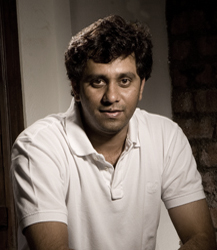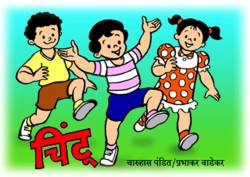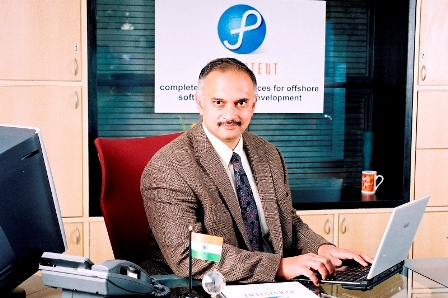(In recent years, Pune is emerging as a hub for animation studios. Chetan Deshmukh, who was working in the top animation studios in Hollywood, returned to Pune a few years ago to set up his own studio, Toolbox Studios. PuneTech caught up with him at his lovely office on S.B. Road, which combines the old world charms of a Puneri wada with the latest technologies, in an attempt to provide workplace that inspires creativity. In this interview, we talk to him about what he’s hoping to achieve, and about Pune’s status as an animation hub)
Can you share with us your story, from the time that you landed up picking animation as a career choice, up to now that you’ve founded Toolbox Studios

Well…It all started of way back in 1993, when I was in my 10th standard. For me being in Animation and Visual Effects, credit goes to my Father, Anand Deshmukh, who is FTII Graduate and a film maker for last 20 years. I grew up around shooting, Editing, Dubbing, Music and post production. So the liking towards the industry was inevitable.
I was a decent student in school and as it used to happen that career was pretty much a group decision then – after 10th, Science and Engineering. It was decided – I would doing the same. However, after 2 years at MIT, Polymer Engineering, I was more than sure that the Animation is the career I want to go for. The hobby in earlier years had turned into profession. Without any guidance, I was getting pretty decent at animation and started contributing towards our studio activities.
I will not call myself a perfectionist, but I do believe in doing things in a best way possible. My dream of going to Hollywood to learn was taking shape. I got an admission at a film school at UCLA in 1999. After graduation, I had to work hard to get my foot in the industry. In my tenure of 4 years as a professional Visual effects artist and Animator, I worked at several studios in Hollywood. Chicago, Last Samurai, Daredevil, Shanghai Knights, torque, Timeline and few more are the feature films to my credit.
Hollywood is such place that you never get enough of, ever. I was learning everyday; but at the same time, my desire to start my own studio was growing bigger. Visual Effects and Animation was the topic in India 4-5 years ago and industry was about to take off. With this desire, I decided to come back and started off with my own small animation and visual effects shop called Toolbox Animation Studio.
What exactly does Toolbox studios do, and what are your future plans?
TOOLBOX is a Visual Effects house and Animation Studio, serving the Motion Picture, Animation and Interactive Industry from its home in Pune, India. With Creativity and Technical ability housed together, TOOLBOX offers a ONE-STOP facility for all their Animation and Visual effect needs.

Our work is the story or has to support the story. Sometimes our work is completely invisible and perfectly integrated, and sometimes simply defying reality. We believe in using science to create art which has particular a magic element to it, with certain appeal for both sides of the human brain.
Our Studio’s commitment to researching and mastering the latest digital imaging technologies allow us to create unique and creative visuals that uphold Toolboxâs reputation as cutting edge contributor to Animation, Gaming and Visual Effects Industry in India and Overseas.
We as in Toolbox, have been laying low till date. I have taken my own sweet time to ensure that work environment is right, work standards are at par with the world and we deliver quality on time. Animation and Visual effects is a collaborative business I feel. After 6 feature films to our credit along with several TV Commercials, we are branching out. We are hoping to hold hands with studios in Germany, Sweden, Paris and United Stated.
As far as animation is concerned, we have always imagined ourselves as content creators and not mere service provider. That’s in motion as well.
A company going Public, is a future to aim at.
Recently you acquired the rights to the cartoon character Chintoo. People from Pune or elsewhere in Maharashtra have grown up with Chintoo, but our other readers might not be familiar with the iconic status of Chintoo. Can you give us some idea of why you acquired the rights to Chintoo, and what you plan to do with the Chintoo character?
To me, Animation is just another medium to tell a story. And to do that convincingly, what you need is a very strong content. Along with that, what we look out for while designing or animating a character is that it should be emotionally believable. Only then people can relate and react to it.

Chintoo along with his family and friends certainly has that quality. With the history of last 20 Years, Chintoo has strong base as far as content is concerned. Chintoo is running in Kannada for last 4 years apart from Marathi. It’s been enjoying the same success in Kannada as it did and does in Marathi. That pretty much rules out the language barrier. Chintoo addressed common problems of kids along with parents which happens practically in every home in India. with certain Cultural differences that we have, a small tweak would keep the humor alive I hope.
Likability and emotional quotient are the factors which are way bigger than the language I feel. Also Chintoo does not have a surname. It is a very funny, smart, witty, humorous character which exists in all colors that we have in India. In a nutshell, I see lot of potential for Chintoo in animation.
To begin with, we would be developing 30-second Chintoo animation clips for TV, Mobile and Web. A social community portal along with games and many more interactive experiences is underway for chintoo at www.clubchintoo.com. Work for TV Episodes will start by next year. Final aim would be to produce an Animated feature Film of Chintoo.
In trying to do all that you would like to do here, what are your primary challenges?
It’s been 4 years that I have been back and started off with Toolbox. Awareness for animation has not grown as it should have. To find a talent is a major challenge. Education is absolutely no way near the mark.
Apart from that the Mindset is a huge primary challenge. Mindset of the employees or students and along with that of the investors. People have been looking at animation as an easy career or an opportunity to earn quick buck without much to do for. We might be in for a rude awakening.
I believe you are using a lot of open source tools in your work. Can you give some details of what technologies/software packages you’re working with? And, as far as I understand, you are not a software development shop, and you don’t really have developers. So how are you coping? And is there some way in which the open source community in Pune can help you?
I have been fortunate enough to work at best studios in the world to see, observe, and learn their pipeline closely. I Have been trying to implement the same here in Pune at Toolbox. We do say that technology can never replace craft but the kind of technology which is available today is taking the animation and visual effects to a different orbit all together. We look at software or hardware as a tool to create whatever we imagine.
We are using Side Effect Software’s Houdini, Autodesk Maya, Eyeon’s Digital Fusion as our primary animation and vfx tools. Real flow would be another example which we use for liquid dynamics. C, C ++ would be the initial skillset which is needed. but in recent past most of the above mentioned programs have adopted “Python” as a core scripting language.
We understand the power of using open source programs where we can customize and create our own tools to suit a particular requirement. But not being a software development shop, process becomes a bit tough. We are developing our own skills all the time. We are fortunate enough to have few artists with inclination towards programming, who are getting trained in this domain. But I would rather let them animate, which they are good at. Open Source community can certainly of great help here to find technologists – who are an integral part of any animation and visual effects studio.
In recent years, Pune has emerged as an “animation hub”. Can you give us a feel for why Pune is being called an animation hub, and what advantages Pune has over other places for animation companies.
It’s been more than 3 years that a committee was setup for Animation, Gaming, Visual effects and comics at MCCIA (Mahratta Chamber of Commerce Industries and Agriculture), Pune under the leadership of Commodore Anand Khandekar. He along with committee members have taken great efforts in helping companies to set up their operations in Pune. Big Animation, Ubi Soft, Jump Games are just a few examples. We have been running awareness programs thru seminars for students and professionals. Dialogue has initiated between various studios, which will help create more collaborative productions. This in turn will help create a better content.
For last couple of years, Studios in Pune have grown significantly for Animation, Visual Effects and Gaming, taking Pune to a level where it can be called Hub for Animation. To add to this, Education Institutes have also been mushrooming in the city. DSK’s Supinfocom would be amongst the best. MIT School of Design, Symbiosis media School along with many private Animation Institutes are contributing towards creating our own talent pool.
Another achievement of the committee is the AVGC (Animation, Vfx, Gaming and comics) policy which has been submitted to government of Maharashtra. So the Animation industry will not only enjoy the similar benefits which IT has but will help flourish and attract foreign studios.
Pune advantage: I will quote Commodore Khandekar’s words here which sum it all up:
Art and culture combined with IT is Animation. Pune has all the ingredients.
While Pune is still an emerging animation hub, there is still a lot more that could be done for making it a truly world class destination for animation. What should we, as a community be doing? And are you aware of any such initiatives that are already working towards it?
Absolutely there is lot that can be done. Some initiatives I have already mentioned above which are being carried out thru MCCIA. Funding, Infrastructure, Distribution Network for the Content are some of the issues which needs to be solved. Animation and Gaming SEZ could be another idea.
Awareness programs for students and quality of education is another serious concern. Which has to be fixed ASAP so as to have better resources and for industry to survive as well.
Do you think there is scope for software / IT professionals to consider animation as a career choice? What kinds of opportunities exist in this domain?
As discussed earlier about technologists and their importance in Animation and Visual Effects , IT surely can play major role in Entertainment Business. With Open source Softwares in our arsenal, opportunities are many.
Every Module in the process to create animated content will have opportunities for programming. Lighting, Rendering, Compositing, Rigging to name a few.
Students from BE Computers, BE IT, MCM with some inclination and passion towards creative industry can surely think of Animation industry as another domain to work for.

![Reblog this post [with Zemanta]](http://img.zemanta.com/reblog_b.png?x-id=bbdc62dc-5b19-43b6-8a07-5746a2cfb23e)

![Reblog this post [with Zemanta]](http://img.zemanta.com/reblog_b.png?x-id=d1ca606d-fe9c-40fc-8e96-f96069defbaa)
![Reblog this post [with Zemanta]](http://img.zemanta.com/reblog_b.png?x-id=f22ad077-662c-401c-b816-21bc02fe726e)




